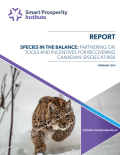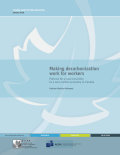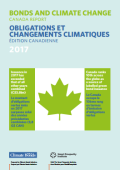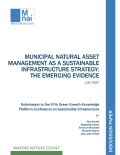



Bonds and Climate Change 2017: The State of the Market Canada marks the sixth annual stocktake of green bonds and green finance in Canada, produced in partnership with the Climate Bonds Initiative.
The State of the Market Canada edition results from a longstanding joint partnership between the two organisations and is a special supplement to the flagship Bonds and Climate Change: The State of the Market global report.
The Canada edition marks specific highlights from the current year, emerging trends, and identifies specific opportunities for green bond market development.

This paper documents an emerging strategy to manage natural assets such as woodlands, wetlands, and creeks in urban areas as part of a sustainable infrastructure strategy. Specifically, the paper explores Canadian local government experience through the Municipal Natural Assets Initiative (MNAI) to identify, value, and account for natural assets’ contribution to municipal government service delivery, services that would otherwise need to be delivered by engineered assets. Evidence from MNAI suggests that a structured, asset management-based approach holds great promise to tackle the twin challenges of declining urban infrastructure quality and declining ecosystem health and could have applicability well beyond Canada.
